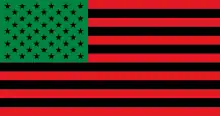African Americans in Africa
The history of African-American settlement in Africa extends to the beginnings of ex-slave repatriation to Africa from European colonies in the Americas.
 | |
| Regions with significant populations | |
|---|---|
| 100,000 (descendants)[1] | |
| 12,000 (descendants)[2] | |
| 3,000–5,000[3] | |
| 3,000[4] | |
| 600–800[5] | |
History
Ex-slaves
The immigration of African-American, Caribbean, and Black British slaves to Africa occurred mainly during the late 18th century to mid-19th century. In the cases of Liberia and Sierra Leone both were established by former slaves who were repatriated to Africa within a 28-year period.
However, other ex-slaves were repatriated from other European territories and colonies. The Tabom people are descendants of Afro-Brazilian ex-slaves who were either voluntarily or forcefully deported to Africa (some of them being deported following the Bahia Malê Revolt in 1835); they constitute a minority ethnic group on the coastal regions of modern-day Ghana and Togo.
Back-to-Africa movement
Following the abolition of slavery in the United States and elsewhere in the Americas, numerous movements for African-American settlement in Africa sprung up and fluctuated in popularity, many of them involving the colonies – Maryland in Africa, Kentucky in Africa, Mississippi in Africa, and others – that would combine to create Liberia. African-American abolitionist and Army officer Martin Delany supported a project for African-American immigration to Liberia later in his lifetime. However, it declined by the end of the 19th century following a string of hoaxes and fraudulent activities associated with the movement.
The Back-to-Africa movement achieved popularity again with Jamaican activist Marcus Garvey and his Universal Negro Improvement Association and African Communities League, who advocated racial pride amongst African-Americans in the United States and pressed for repatriation of slave descendants to Liberia and Sierra Leone. The movement fell apart by the end of the 1920s, but influenced both the Nation of Islam and the Rastafari movement; the latter, a Jamaican that saw Haile Selassie I, the emperor of Ethiopia, as a reincarnation of Jesus and Garvey as a patron saint, managed to secure a settlement in Shashamane, which exists to this day and constitutes over 200 individuals out of an urban population of around 95,000.
People
Ghana
Another African-American settlement is concentrated in Accra, Ghana, which has more than 1,000 African-American residents, primarily originating from the United States, who reside in the country on work permits, with a few on permanent resident status. Accra has long attracted African-American tourists since the country became the first African country to gain independence from the United Kingdom in 1957 (W. E. B. DuBois settled in Ghana in his last years and is buried in Accra), and the government has made controversial overtures to gain more African-American residents and tourists, including enacting a right of abode law in 2001.[6][7][8][9][10] Organizations have been established to support African-American residents in Ghana, including the African-American Association of Ghana.
Liberia
Americo-Liberian people,[11] are a Liberian ethnic group of African American, Afro-Caribbean, and Liberated African descent. A similar ethnic group of Americo-Liberians are the Sierra Leone Creole people, who shared similar ancestry and related culture.[12] Americo-Liberians trace their ancestry to free-born and formerly enslaved African Americans who emigrated in the 19th century to become the founders of the state of Liberia. They identified there as Americo-Liberians.
Sierra Leone
Some African Americans, following resettlement in Canada, also participated as founding settlers in Sierra Leone and other recaptive repatriates settled in present-day Côte d'Ivoire.[12]
See also
References
- Flynn, Daniel. "Krio heritage rich but crumbling in Sierra Leone". U.S.
- "Liberia, the unsuccessful return of African descendants". Lisapo ya Kama. 19 January 2018.
- Essa, Azad. "Why some African Americans are moving to Africa". www.aljazeera.com.
- Walker, Kenneth. "The Discomfort of African Americans in South Africa". The Root.
- CNN, Thomas Page, for. "Meet the Rastafarians of Ethiopia - CNN". CNN.
- Essien, Kwame,"The Atlantic Diaspora: African American Communities in Ghana, 1980 to 2005". Paper presented at the annual meeting of the Association for the Study of African American Life and History, Atlanta Hilton, Charlotte, NC, 15 December 2013.
- Mensah, Ishmael, "Marketing Ghana As A Mecca For The African-American Tourist", GhanaWeb, 10 June 2004.
- "Ghana and The Right to Abode For African Americans" Archived 2017-04-24 at the Wayback Machine. ChickenBones.
- "Ghana's New Money", Time magazine, 21 August 2006.
- Lydia Polgreen, "Ghana's Uneasy Embrace of Slavery's Diaspora", The New York Times, 27 December 2005.
- Cooper, Helene, The House at Sugar Beach: In Search of a Lost African Childhood (United States: Simon and Schuster, 2008), p. 6
- Liberia: History, Geography, Government, and Culture, Infoplease.com
